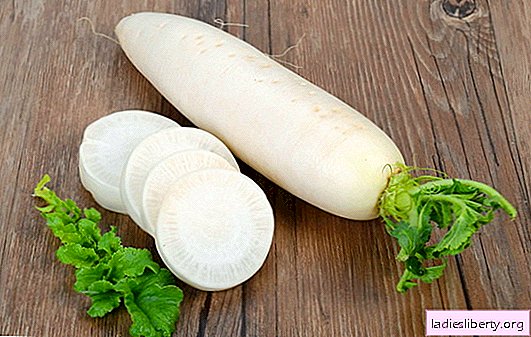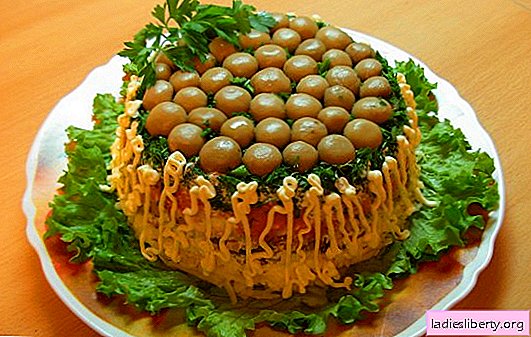
Japanese radish daikon is included in the daily diet of East Asians.
Unlike regular radish or radish, daikon is not bitter, since it contains no mustard oils.
There are many varieties of varieties of this root crop.
Most often, you can find a daikon, in shape resembling a giant carrot.
Such a white radish weighs more than half a kilogram and is up to 60 cm in length.
Another variety resembles a large turnip of white color.
Cutting such a daikon, you can see that inside it is pink. Regardless of the variety, daikon is beneficial for the human body. Its composition includes vitamins and elements essential for maintaining health.
Daikon: composition, calories and uses
Useful daikon low-calorie. 100 g of product contains only 21 kcal. Moreover, it is able to cover more than 30% of the daily requirement for vitamin C. But even more is the content in the Japanese radish of B vitamins and, of course, a lot of other useful components:
• Vitamin C - normalizes the formation of bone and connective tissue. It is a powerful antioxidant and activates the protective functions of the body;
• Vitamins B1, B2, B7, B9 - participate in the metabolism, maintain a healthy state of the skin and mucous membranes. Maintain an optimal hemoglobin level. Responsible for the harmonious development of the fetus during pregnancy;
• Beta-carotene - helps to eliminate toxins from the body. Essential for a healthy eye muscle;
• Calcium - is responsible for the integrity and strength of bone and muscle tissue. Provides normal blood coagulation. It has anti-inflammatory and antioxidant effects;
• Iron - prevents the development of anemia. Enhances the body's ability to withstand bacteria and viruses;
• Sodium - provides healthy kidneys, nervous and muscular systems. Regulates the accumulation of water and salts in the body;
• Potassium - is responsible for heart health, and is also involved in the formation of digestive enzymes;
• Iodine - maintains a healthy thyroid gland and is responsible for the body's resistance to external viruses;
• Phosphorus - is involved in the normalization of the functioning of the nervous system, the work of the heart muscle, and brain activity;
• Selenium - iodine assistant for thyroid care. In addition, selenium minimizes the possibility of oncology.
Healthy daikon is used just as a side dish for fish, added to salads and used to make soups. True, it should be noted that in the course of any heat treatment, daikon loses some of the useful properties. The leaves of the Japanese root crop are also useful. They have an increased concentration of vitamin C. Daikon leaves are also suitable for cooking all the same salads, soups, and even stews. As for freshly squeezed juice from this sweet radish, it is doubly useful. But it is not recommended to drink more than a glass per day of such a drink.
Daikon: what are the benefits for the body?
Daikon has a smoothed aroma and taste, so it is pleasant to eat it, adding to various dishes. Thus, the body receives a lot of vitamins, macro and micro elements that it needs daily.
The daikon benefits are also enhanced by the fact that this Japanese radish does not absorb toxins when ripe. In fact, it is an environmentally friendly product. In addition, it removes toxic compounds from the body, after eating it.
Daikon does not contain allergic components, so it is useful to eat it for everyone. Allergy sufferers may even feel that their tendency to various food allergies will slightly decrease after they get used to eating daikon in food.
Specialists have long been saying that there are cancer cells in every body. The predisposition to their development is individual for everyone and depends on various factors, from genetics to the way and conditions of life. The use of daikon reduces the risk of oncology in any of the categories of people.
Fresh daikon, entering the body in its raw form, removes cholesterol from it. Thus, diseases such as rheumatism, arthrosis and arthritis recede. The kidneys and liver are also cleansed, and even the stones in them begin to dissolve and gradually come out.
Raw daikon is good for your health. It normalizes the work of the heart and eliminates possible problems in the work of the genitourinary system.
Radish from Japan quickly and permanently relieves hunger. This is due to the high content of fiber in it. And since the calorie content of this root crop is very low, this is a real find for those who want to lose weight.
This white root vegetable is also useful to those who suffer from diabetes. The daikon's health benefits for such people are that it controls the level of sugar in the blood, reducing it to optimal levels.
Anyone in our time knows what insomnia is and how stressful situations are sometimes knocked out of the regime. Daikon helps restore the nervous system and normalize sleep.
Even those who wish to get rid of a hangover will discover the benefits of daikon. To do this, just eat a handful of grated radish or drink freshly squeezed juice from it.
Daikon: what is the harm to health?
Daikon can only be harmful if consumed excessively. Consider the high fiber content in radish. People who have a malfunction in the digestive system and problems with the intestines, it is better not to overeat with a sweet root crop. This is explained by the fact that with a large intake of natural fiber in the body, it can provoke difficulties in the functioning of the stomach and, as a result, cause an exacerbation of existing diseases of the digestive tract.
In case of urolithiasis, in order to avoid harm from daikon, it is necessary to consult a doctor regarding diet.
Acute gastritis, ulcers of the stomach and duodenum are direct contraindications to the consumption of daikon in food.
Daikon for children: useful or harmful?
Daikon is good for children's health. Many parents have been introducing it into their children's diet since the age of three. With its use, salads are prepared or just let the kids crunch the radish and train the teeth. In addition to the fact that the child’s body is saturated with vitamins and useful substances, the jaw is also being developed for proper bite and dental health in the future. True, it should be noted that not every kid daikon will like it.
Daikon is a low-calorie, environmentally friendly, hypoallergenic root crop. Therefore, it is useful for children and has a well-deserved right to be present in their daily diet.
Contraindications for the use of Japanese radish by a child may be the prohibitions of a doctor. With problems with the kidneys, liver and digestive system, daikon can be harmful. Therefore, his presence on the children's table is minimized or completely eliminated.
Daikon's beauticians
It is known that the condition of the skin of the face directly depends on the condition of the intestine. The slightest problems in the abdomen - and all this is already reflected in the form of rashes, fading, dryness, or vice versa, excessive oily skin. Including a useful daikon in your diet as often as possible, you can get a great way to naturally cleanse your intestines from toxins and toxins.
White Japanese radish juice has a whitening effect. Using a cotton swab to wipe your face with the juice of a healthy daikon, you can:
• Whiten age spots, freckles;
• Rid pores of dirt and remove toxins from the layers of the skin;
• Counteract germs and get rid of rashes;
• Smooth fine wrinkles;
• Give the skin a smooth texture and a healthy shade.
Through the skin, our body eats no worse than through the digestive system. Daikon juice, absorbed into the skin, will saturate it with vitamins and beneficial elements.
To enhance the effect and get more benefits from white radish for your skin, you can use a mask. To do this, grate the root crop on a fine grater and mix it with olive oil. In 50 g of grated daikon, it is enough to add a teaspoon of oil, which, however, can be not only olive, but also any other vegetable. Apply this gruel to a clean face and soak for 20 minutes. Then wash with warm water. Such a mask maximally nourishes the skin with an indispensable vitamin composition, relieves it of excess fat and normalizes the water-salt balance in the depths of the tissues. The skin will be moisturized, wrinkles will be smoothed out slightly, and dark spots will become less noticeable.
Daikon juice promotes tissue regeneration and has a beneficial bactericidal property. This makes him a good helper in the treatment of skin ulcers. Compresses with freshly squeezed juice of radish are applied to the affected area of the body. It is more advisable to use such an auxiliary method only during the full treatment of ulcers and with the permission of a doctor.
Accelerate the healing of scratches and small wounds will also help white root juice.
Growing daikon
Raising a daikon is not difficult. Preparing the soil for sowing is no different from how it is prepared for planting other root crops and vegetables. Our climatic conditions allow us to plant white Japanese radish on open ground only in early June. In order to grow it earlier or get a late harvest, you need to get a greenhouse. Watering and caring for a growing daikon is also necessary, as well as for all other crops in your own garden.
After 1.5-2 months, the daikon crop is ready for harvest. It is better to do this in dry, clear weather. Then the root crops will be easily removed from the beds.











